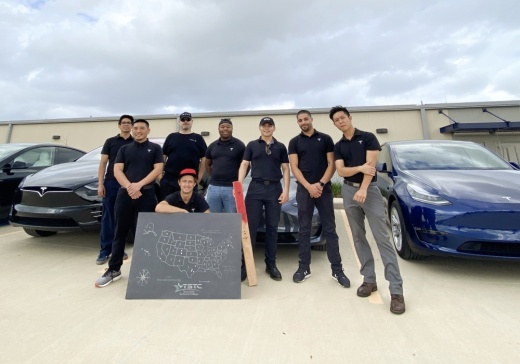Called Tesla START, the college kicked o the 16-week program with eight students. The program aims to give students the skills necessary to become advanced electric vehicle technicians at Tesla, according to the TSTC website.
According to the college's website, the program has students learn technical expertise and earn certifications through a blended approach of in-class theory, hands-on labs and self-paced learning.
Tesla START is one of over 50 programs and degrees offered by TSTC across several industries. Students attending the Tesla START program come from across the country for an opportunity to graduate from a Tesla-certified program. During the program’s initial October cohort at its Rosenberg campus, student Vincent Packer drove from California.
“I want to be a part of it because that’s the future,” Packer said in a TSTC news release. “It took me a long time to decide that I wanted to be a mechanic, but it was the first thing I learned how to do in high school, and I ended up always going back to it. Once I started to think about it, if I get into Tesla, that can be my career.”
Students such as Packer make the trek to Fort Bend County to enroll in the program at the Rosenberg campus, one of seven other Tesla START partnerships in the country.
Teaching for placement
Between the college’s Waco and Rosenberg campuses, the Tesla START program has graduated 43 students, according to the school’s data. The college and Tesla vets all applicants to establish that they have enough automotive experience, said Kori Bowen, the college’s senior executive director of workforce training.
That can either be through an associate degree in automotive engineering or equivalent experience in the field. After a student completes the program, they are qualified to work at any Tesla service center in the world, Bowen said.
“Tesla technicians are everywhere,” she said. “They can work at approved maintenance sites. They also travel to take care of these vehicles.”
However, Tesla and TSTC maintain cohort sizes to meet the company’s technician demand while not oversaturating the market, she said.
Though the number of technicians was undisclosed, Tesla reported its total worldwide employees reached 99,290 on Dec. 31, according to an annual listing with the U.S. Securities and Exchange Commission. That number represented a 40% growth year over year compared to the 70,757 employees reported in 2020.
The Tesla START program that feeds that pipeline was launched in 2019 with more than 300 graduates to date. At a cost of a little more than $2,700 for the 16-week program, students are paid $15 an hour and receive full health benefits while in the program, according to the college’s website.
While the students are enrolled in the program, students are considered Tesla START technicians.
Ongoing partnership
Tesla approached TSTC with the idea for the partnership based on the college’s strong track record of success and its unique funding model, Bowen said. Unlike traditional universities, which are funded based on enrollment, TSTC is paid for through its job placements.
“We’re [highly] motivated to place our graduates in jobs because that’s our bread and butter,” she said.
The first Tesla START cohort at TSTC’s Rosenberg campus did not utilize its own dedicated space when it kicked off in October.
By February, TSTC had erected the Faraday Center, a $3 million, 6,000-square-foot building designed around the needs of the program.
“When we built that lab in Fort Bend County, we made sure that it would be multipurpose for any future possible Tesla needs,” Bowen said.
For example, the Faraday Center has room in its bays to house Tesla’s upcoming Cybertruck should the START program include that vehicle in its curriculum, Bowen said.
“There’s really good value in being a Tesla employee,” Bowen said.





